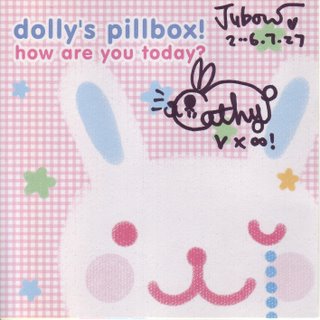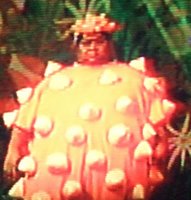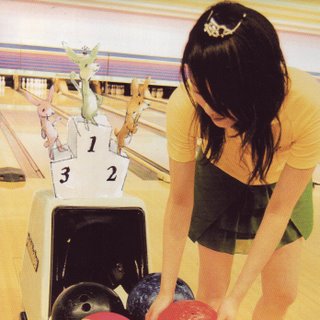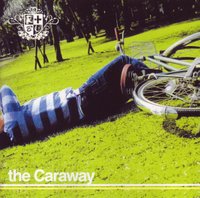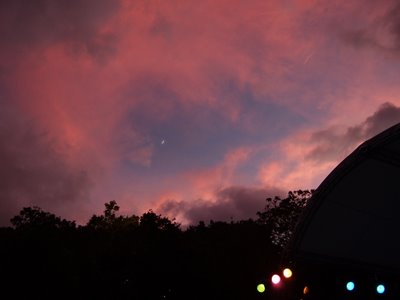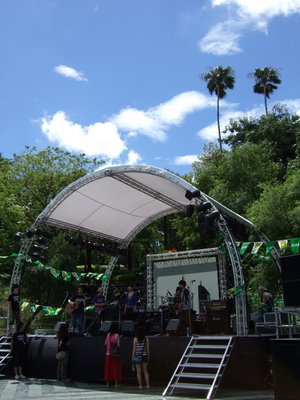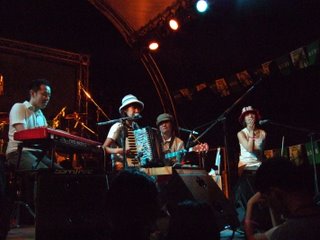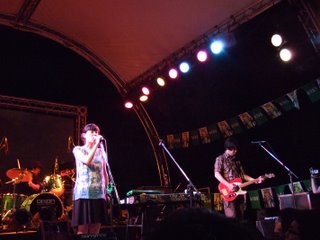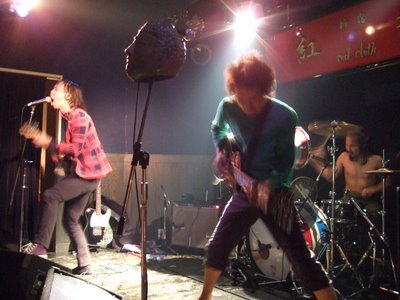
What’s the difference between mainstream and avant-garde music?
That’s a question I’ve been thinking about recently, especially after I saw a show called “Chika-teki Ongaku (Underground Music)” at the Shinjuku Red Cloth.
‘Mainstream’ and ‘avant-garde’ are relative terms. Something that was out-there one day might become ordinary the next. For example, at a certain point in the 70’s, progressive rock, which was once avant-garde, became mainstream. But then, in reaction to the excessively technically demanding nature of prog, punk arose, and its simple, aggressive beat was the new avant-garde. Until it too became mainstream, and prog-like music once again seemed radical and new.
Whether a type of music is mainstream or avant-garde isn’t decided by how it sounds—technically complex music could be mainstream, while simple 50’s-type rock might become radical. In Japan, Spangle call Lilli line, which makes music that is beautiful and unlike anything you’ve ever heard on Top 40 radio, has just got one of its songs featured in a shampoo commercial.
There are some sorts of music, however, that will probably always be stuck in the avant-garde corner of the musical world. Cecil Taylor, for instance.
What was interesting about the Red Cloth event was it bought together four groups that could be labeled ‘avant-garde’ or ‘underground’—Panic Smile, Watusi Zombie, Ruins Alone, and Core of Bells—but some of them seemed permanently avant-garde while others appeared to at least have a shot at the mainstream (if they wished it in the first place).
An example of the latter was the trio Watusi Zombie. They are weirdoes in some ways—the singer covers the mike with a plastic Buddha mask, they have two guitars but no bass, and for the finale they always toss the drum set from the stage into the audience section, and finish the gig literally surrounded by fans. But they play straightforward, fast, hypnotically repetitive punk rock, to which the fans head-bang. Maybe their quirks will one day become the added ingredients that will make them palatable to a mainstream audience that has suddenly developed adventurous tastes. Who knows—they did play at the Fuji Rock Festival last year…
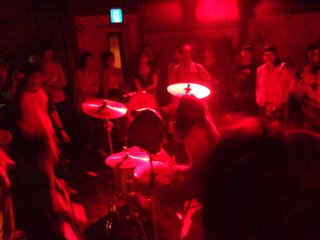 Ruins Alone, on the other hand, I can’t see becoming mainstream in a hundred years. It is the unit of Tatsuya Yoshida, drummer of the experimental duo Ruins, which has been around since 1985. I remember I owned one of their CDs in college and a friend went through all my disks and said, 'I like your CD collection, except that band called the Ruins—I hate them!' They are, indeed, a group people usually love or hate—chaotically-structured, fast-moving, bass and drum musical passages, and yelps and wails. I liked them but not enough to buy more than one of their albums.
Ruins Alone, on the other hand, I can’t see becoming mainstream in a hundred years. It is the unit of Tatsuya Yoshida, drummer of the experimental duo Ruins, which has been around since 1985. I remember I owned one of their CDs in college and a friend went through all my disks and said, 'I like your CD collection, except that band called the Ruins—I hate them!' They are, indeed, a group people usually love or hate—chaotically-structured, fast-moving, bass and drum musical passages, and yelps and wails. I liked them but not enough to buy more than one of their albums.When I found out recently though that Yoshida is still playing as Ruins Alone, I became interested in seeing him live. I’m glad I did.
Yoshida took a long while to set up for the solo act, placing the drums at the front-center of the stage and putting all the mikes in the house around him. He seemed one of those bearded, middle-aged Japanese men who keep their feelings to themselves. But he became a different person once he said, ‘Hi, I’m Ruins Alone,’ and pounded the drums to start the set. His drumming was violent, animalistic, hyperactive and relentless, like an endless videotape loop of a cheetah going after its prey.
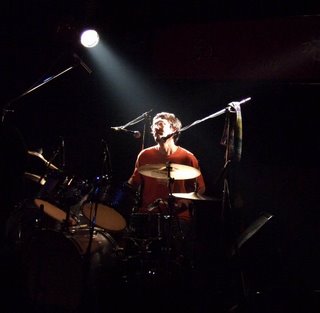
Ruins Alone
Somewhere between Ruins Alone and Watusi Zombie in terms of the possibility of going mainstream was the quartet Panic Smile. Ian of Clear and Refreshing told me that Panic Smile is a seminal band in the Fukuoka underground scene, spawning a number of like-minded bands and imitators (I’m stitching this together based on hazy memories of a drunken evening, so the details of what Ian said may not be exactly accurate…), and I’d been wanting to see them. They were good. First off, there’s diversity in their band member composition: the drummer is a girl, the bassist is a really big guy and the guitarist is a foreigner. They’re all good musicians, especially the guitarist, who blow-torches through solos. But they’re a little too different so it’s hard to imagine a day when their post-punk sonic experimentations will be played on commercial radio. Though, one never knows.
